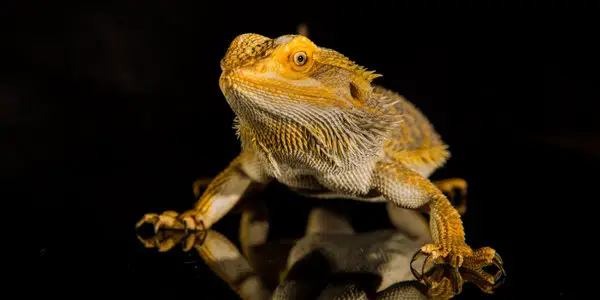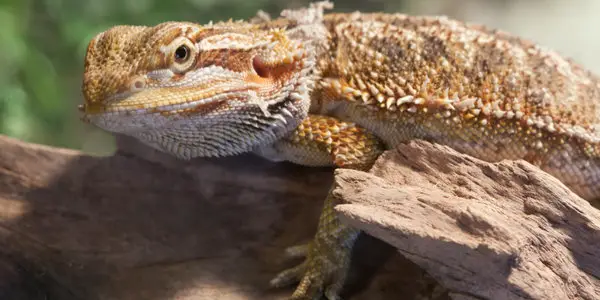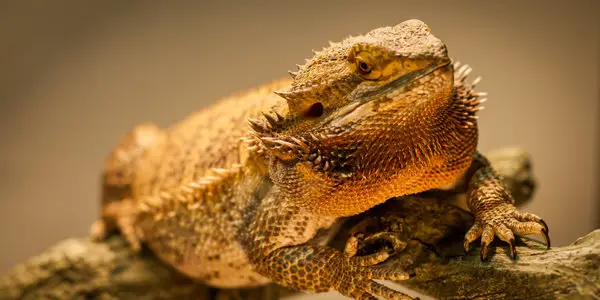Those ages 4 months and below, should be given calcium daily, while juvenile bearded dragons under one year should be given calcium 5 times a week.
With younger adults aged between a year and two, giving them calcium 4 times a week is enough, while more mature ones need calcium supplements 3 times weekly.
Special circumstances such as a gravid female might require giving the lizard more calcium than you would routinely. As for sick bearded dragons, you should give them calcium supplements 6 days a week to help speed up recovery.
Your vet might recommend that you provide them with calcium supplements daily, especially if the underlying illness results from calcium deficiency.
Bearded Dragon Calcium
Calcium is one of the most important minerals to consider in the food you give to bearded dragons. It is arguably, the most vital mineral for this animal.
Beardies get calcium from bugs, shells, snails, and vegetables in the wild. But this does not guarantee that they do get enough calcium.
In captivity, the amount of calcium the beardie gets solely depends on what the owner feeds it with. Some vegetables and worms are rich in this mineral and should form the bulk of their diet.
Some of the other foods also contain contents that interfere with calcium absorption. A balance between these is vital to ensuring that your pet gets enough calcium.
Another way pet owners ensure that they provide the bearded dragons with enough calcium is by giving the bearded dragon calcium supplements. These supplements help bridge any deficit that might be there from the diet.
Below, we explore more about these supplements, the ideal diet, and a suitable feeding schedule for bearded dragons to ensure that the pet gets vital calcium.

How Much Calcium Bearded Dragons Need at Any Age?
| Age | Frequency |
| Below 4 months | Daily |
| 4 months – 1 year | 5 Times a week |
| 1-2 year | 4 Times a week |
| >2 years | 3 Times a week |
It is vital to provide adequate calcium to bearded dragons as they are important for their health. Calcium deficiency can cause severe health issues to bearded dragons and cause them to die.
It is important to provide a well balanced diet for your bearded dragon in order for them to have adequate nutrients of calcium.
Do You Give Bearded Dragons Calcium Every Day?
Calcium is a safe mineral to give the bearded dragon daily. In fact, you should try to ensure that its staple diet is rich in this mineral since bearded dragons needs it in high amounts.
When it comes to calcium supplements, you can give the beardies the mineral daily, but it is unnecessary, especially for mature, healthy bearded dragons.
Ultimately, the best guide is a vet who will assess the health status of the beardie and recommend the best amounts and ideal frequency that is specific to your bearded dragon.
If you have a new bearded dragon, it is also vital to take it to a vet for an overall health assessment.
Such tests will guide you on the ideal diet and suitable supplementation for the lizard as per its age, health status, and growth requirements.
Can You Give A Bearded Dragon Too Much Calcium?
Although not common, giving your bearded dragon too much calcium is possible. It results in a medical condition referred to as hypercalcemia.
Factors that can contribute to giving the beardie excess calcium include over-supplementation. It occurs when you provide more supplements or more frequently than recommended. Thus, it is best to adhere to the supplements feeding schedule to avoid this.
Another factor that leads to too much calcium in the body is when they absorb too much Vitamin D3. Vitamin D3 comes from sunlight, but the bearded dragons in captivity get it from UVB light in their enclosure.
These reptiles need vitamin D3 to absorb calcium. When they have too much Vitamin D3 in their system, they absorb excess amounts of calcium.
Calcium overdose is not healthy for a bearded dragon. It can lead to death if not detected and corrected early. Too much calcium also leads to bone weakness, hardening soft tissues, kidney stones, and deteriorating heart health.
Some of the signs showing that you are giving your bearded dragon too much calcium include lethargy, constipation, seizures, muscle tremors, poor mobility, and general weakness.
To avoid hypercalcemia, take your bearded dragon to the vet for assessment before you start giving it calcium supplements.
In addition, you should not give it calcium supplements with Vitamin D3 if the UVB light in its enclosure is conducive.

How Often To Give Bearded Dragons Supplements?
Supplements are meant to aid and add to the vitamins and minerals the bearded dragon gets from its food. They do not serve as a replacement for a proper diet.
Having said that, how often you should give your bearded dragon calcium supplements depends on various factors such as age, health status, and if a female is gravid or not.
In general, professionals recommend giving your bearded dragon supplements every 2 to 3 times a week. It may be higher if your bearded dragon has a deficiency of particular nutrients.
The best and most effective way of knowing how often you should feed your bearded dragon with supplements is to consult a vet.
Can Reptiles Have Too Much Calcium?
Yes, reptiles can have too much calcium. Although it is one of the minerals they need in high concentrations, they might absorb more than their bodies need.
The situation arises from feeding too many calcium supplements or having too much Vitamin D3 in their bodies. It is a condition you should avoid because it can cost the reptile its life.
What Gives Bearded Dragons Calcium?
Bearded dragons get calcium primarily from their diet, meaning that it is from plants and insects. Upon digestion, their bodies absorb the calcium in the food into the bloodstream.
Calcium-rich vegetables that are safe to feed a bearded dragon include prickly pear, dandelion leaves, collard greens, endive, mustard greens, cilantro, romaine lettuce, chicory, rosemary, turnip greens, and kale.
Due to having a high amount of oxalates that bind calcium hindering its absorption, vegetables such as kale, bok choy, and broccoli should be given to the bearded dragon sparingly even though they are rich in calcium.
Treats such as figs and blackberries are also rich in calcium and provide an occasional good source of the mineral.
Another way through which bearded dragons get calcium is through calcium supplements. You can mix these supplements with the bearded dragons food through a process known as dusting.
It may also be added to its water for the bearded dragon to drink. The method effectively ensures your bearded dragon gets enough calcium, especially if diagnosed with calcium deficiency.
Light is yet another effective method through which bearded dragons get calcium. It is more effective in wild bearded dragons who have direct exposure to sunlight. Pet owners provide their lizards with UVB light to replicate this in captivity.

How Do I Know If My Bearded Dragon Has Low Calcium?
Signs of calcium deficiency in bearded dragons are not easy to detect at the onset. Since they are a manifestation that the pet’s health is not at its best, it might take you a while to realize that your bearded dragon has low calcium.
Even so, if you notice the following signs in the reptile, there’s a significant probability that it is suffering from low calcium.
Calcium Deficiency Symptoms in Bearded Dragons
1. Lethargy
Bearded dragons are active animals. They often roam around, climb and remain active. A lazy bearded dragon will remain in minimal activeness but get back to being active within a few hours.
Lethargy is different from laziness in bearded dragons since the pet remains inactive for several days or weeks. If your pet is hardly moving, it is probably lethargic.
The reptile becomes lethargic to save energy since it does not have enough calcium in the body.
2. Swollen Limbs
Calcium is vital to bone health in these reptiles. It is no wonder that low calcium affects the legs, making them swollen. Inspect the eggs, especially around the hip area, for any signs of swelling.
When calcium levels drop, the beardie releases extra minerals such as phosphorus, making the soft tissues swell.
A bearded dragon with swollen legs will also walk abnormally because of the additional weight on the legs.
3. Muscle Twitching
Muscle twitching occurs when the beardie’s body starts utilizing energy from the muscles because there is a calcium deficit in its system.
If you notice muscle twitching, there’s a high chance that your beardie is suffering from low calcium, and you should start giving it supplements immediately. In addition, it is good to provide it with vitamin D as well.
4. Change In Droppings Color
A beardie suffering from low calcium will have greener droppings, unlike the usual brown with white or yellow marks of urate. It results from the bile its body releases for digestion.
When the reptile doesn’t eat sufficient vegetables, the bile is more than required.
These signs can be mild or severe depending on the extent of the calcium deficiency. Keep an eye on your pet beardie to avoid missing out on any of these indicators of low calcium in its system.
Tips To Avoid Calcium Deficiency In Bearded Dragons
Besides knowing the signs of low calcium in a bearded dragon, it is also vital to know how to avoid the situation. Here are helpful tips to keep your beardie safe from calcium deficiency.
1. Proper Diet
Provide your pet beardie with foods that are rich in calcium. It is one of the easiest ways to ensure that the pet gets enough amounts of the mineral.
In addition, these foods should be low in oxalates and phosphorus, which hinder calcium absorption.
2. Suitable UVB Lighting
Pet bearded dragons get their Vitamin D3 from UVB light. Proper lighting helps them get enough Vitamin D3, and consequently, they can absorb calcium effectively.
3. Supplementation
Calcium supplements are another way of ensuring the pet does not suffer from low calcium. The market has plenty of calcium supplements for bearded dragons you can choose from.
Go for those with suitable calcium content, have no additives, contain safe ingredients, and are within your budget.
Do Bearded Dragons Need Calcium Supplements?
Most bearded dragon owners often wonder whether calcium supplements are necessary or if the reptile can get enough of the mineral from their diet.
It is even more common among the owners who go to great extents to replicate the beardies’ natural environment. So, are calcium supplements necessary for a bearded dragon?
Calcium supplements are essential to a beardie even when you provide a proper diet and ideal UVB lighting. Even when you try to make the captive environment resemble that in the wild, it is still hard to achieve the exact results.
Furthermore, not all wild bearded dragons are in optimal health, meaning that these lizards can lack some vital nutrients even in the wild.
Benefits of Calcium Supplements for Bearded Dragons
There are several reasons why you should give your beardie calcium supplements. Below are the major ones.
1. Ensures Sufficient Calcium Intake
We cannot emphasize enough the importance of calcium for bearded dragons. Giving them the mineral supplement ensures that your lizard is getting enough to support various body functions.
As earlier mentioned, the supplements do not replace a calcium-rich diet. Instead, they complement it and jointly ensure that your beardie does not suffer from calcium deficiency.
2. Prevents Illnesses
Calcium promotes the overall well-being of a bearded dragon. When there is a deficit, the various organs and organ systems do not function effectively.
It can be detrimental to the beardie, especially under prolonged durations.
A bearded dragon without enough calcium is also susceptible to metabolic bone disease. Calcium supplements help bridge any calcium deficit from the diet and help prevent calcium deficiency illnesses.

Conclusion
Calcium is a vital mineral in the life of a bearded dragon. It is, therefore, essential to ensure that the pet gets sufficient amounts. A proper diet, suitable UVB light, and calcium supplements ensure that your pet gets enough calcium.
A deficit of this mineral is detrimental to its health. Some of the indicators of low calcium include muscle twitching, lethargy, and poor bone development.
Increase the calcium intake and talk to your vet when you notice such. By providing enough calcium, you play a significant part in giving your bearded dragon a quality life.